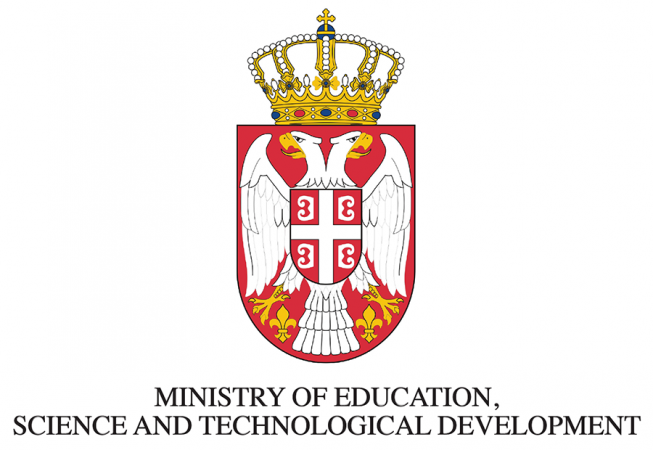First Serbian International Conference on Applied Artificial Intelligence
Invitation and Venue
It is our great pleasure to invite you to the Second Serbian International Conference on Applied Artificial Intelligence (SICAAI).
The Conference will be held in Kragujevac, Serbia, on May 19th – 20th, 2023. Kragujevac is the fourth largest city in Serbia and the administrative center of the Šumadija District. Today, the city represents a modern industrial and commercial center of the country. It enjoys the status of an education center housing the University of Kragujevac, one of the region’s largest higher education institutions.
The Conference will be held on the premises of the Rectorate of University in Kragujevac (Jovana Cvijića bb, 34000 Kragujevac, Serbia) and online via Big Blue Button service of the University of Kragujevac.
It is our great pleasure to invite you to the First Serbian International Conference on Applied Artificial Intelligence (SICAAI).
The Conference will be held in Kragujevac, Serbia, on May 19th – 20th, 2022. Kragujevac is the fourth largest city in Serbia and the administrative center of the Šumadija District. Today, the city represents a modern industrial and commercial center of the country. It enjoys the status of an education center housing the University of Kragujevac, one of the region’s largest higher education institutions.
The Conference will be held on the premises of the Rectorate of University in Kragujevac (Jovana Cvijića bb, 34000 Kragujevac, Serbia) and online via Big Blue Button service of the University of Kragujevac.
AAI 2022 Paper Publication
After reviewing full papers from the AAI 2022 Conference will be published by Springer Verlag in the series “Learning and Analytics in Intelligent Systems” under the title “Applied Artificial Intelligence”.
Objectives
Artificial intelligence (AI) has revolutionized information technology. The new economy of information technology has shaped the way we live today.
The Serbian International Conference on Applied Artificial Intelligence (SICAAI) will provide an excellent international forum for sharing knowledge and results in theory, methodology and applications of Artificial Intelligence and Machine Learning in academia and industry.
Nowadays, artificial intelligence has been used in every company where intelligence elements are embedded inside sensors, devices, machines, computers and networks. The conference organizers aim to gather the attention and contribution from researchers, academicians, and scientists from various fields of Artificial Intelligence community to create an integrated approach towards global exchange of information on technological advances, scientific innovations, and the effectiveness of various regulatory programs towards Artificial Intelligence application.
It also aims to:
- provide early stage researcher with an inspiring event allowing them to connect to relevant experts in related fields.
- provide an exciting venue for researchers to network and establish national and international collaborations;
- bring together leading experts from all relevant scientific domains to advance the understanding of Artificial Intelligence.
Mini-Symposia
Call for mini-symposium is still open until February 15th, 2022. Please download and use mini-symposium template proposal by clicking LINK (docx) or LINK (LaTex). Each mini-symposium may have one or more organizers. Organizers have to attend the conference and chair their session. Each mini-symposium should include at least 3 presentations. It is recommended that the Organizers invite a senior researcher to give a ‘mini-symposia keynote’. Each presentation will be scheduled for 15 minutes including questions and answers. The organizers are responsible to contact the speakers to participate and present in their session. The abstracts will be submitted and reviewed via the conference system. Please note that the AAI 2022 Conference program can have only one presentation per person. Mini-symposium proposals should be submitted by email to: AAI2022@kg.ac.rs.
- Mini-Symposium I – Soft Computing Techniques in Multi-Criteria Optimization Problems – Organisers: Mališa Žižović, Dragan Pamučar – ABSTRACT (pdf)
- Mini-Symposium II – Artificial Intelligence in Medicine: Current Situation and Future Trends – Organisers: Tijana Šušteršič, Nenad Filipović – ABSTRACT (pdf)
- Mini-Symposium III – Artificial Intelligence Applications in Social Sciences – Organiser: Branko Urošević – ABSTRACT (pdf)
- Mini-Symposium IV – Artificial Intelligence and Entrepreneurship – Organisers: Dubravko Ćulibrk, Branislav Kisačanin – ABSTRACT (pdf)
- Mini-Symposium V – Supercomputing for Artificial Intelligence – Organiser: Vladimir Srdanović – ABSTRACT (pdf), PROGRAM (pdf)
Important Dates
- Submission of scientific contributions (extended abstracts on two or four pages) deadline: March 31st, 2022 EXTENDED April 15th, 2022
- Notification of acceptance deadline: April 10th, 2022 EXTENDED April 25th, 2022
- Registration fee payment deadline: April 30th, 2022
Organizers
- University of Kragujevac
- Serbian Academy of Sciences and Arts
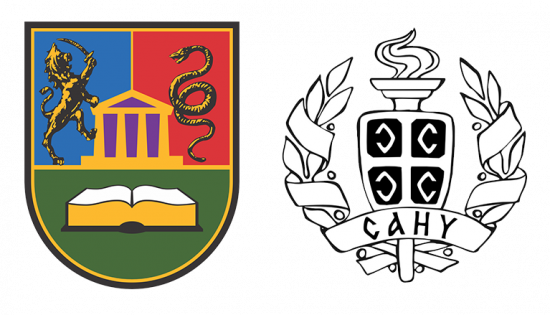
Technical Co-sponsor
- Serbia and Montenegro chapter of IEEE Computer Society

Supported by
- The Ministry of Education, Science and Technological Development of the Republic of Serbia
Plenary Speakers
- Prof. Zoran Obradović – Temple University
- Prof. Michalis Zervakis – Technical University of Crete
- Prof. Sašo Džeroski – IJS Ljubljana
- Prof. Themis Exarchos – Ionian University
- Prof. Priyanka Harjule – Malaviya National Institute of Technology Jaipur
- Prof. Veljko Milutinović – Adjunct Professor, University of Indiana, Bloomington, IND, USA, Visiting Professor, University of Kragujevac, Serbia, Life Member of the ACM, Life Fellow of the IEEE, Member, a Former Trustee and Treasurer, of Academia Europaea, London, UK, Founding Member of the Serbian National Academy of Engineering, BEG, SRB, Foreign Member of the Montenegrin National Academy of Sciences and Arts
Prof. Zoran Obradović – Temple University
Title: Machine Learning from Streaming Data with Scarce and Imprecise Labels

Abstract
Accurate predictions at multiple temporal and spatial scales from many sensors can potentially enable innovations across various industries. For example, moving from corrective to predictive maintenance of complex infrastructure based on knowledge extracted by many instruments could be more cost effective since this can facilitate early and interpretable risk predictions with uncertainty estimates and allow optimization of damage mitigation and prevention strategies. Similarly, in proactive emergency monitoring, a network of sensors could estimate operating conditions before they occur, which can direct deployment of control measures for avoiding undesirable outcomes. In this talk an overview of our recently developed methods to facilitate such end-to-end solutions will be discussed within the context of our ongoing DOE funded project aimed at predictive analytics in a large electricity grid from multiple phasor measurement units. Challenges and the proposed solutions will be discussed related to (1) deep-learning based detection and classification of local and system-wide events using rapidly refined, partially inspected event labels; (2) digital-twin based data enhancement for events insufficiently represented in field-recordings over the training period; and (3) transfer learning to leverage relevant labeled events from a different network to minimize additional labeling effort.
Biography
Zoran Obradović is a Distinguished Professor and a Center director at Temple University, an Academician at the Academia Europaea (the Academy of Europe) and a Foreign Academician at the Serbian Academy of Sciences and Arts. He mentored 45 postdoctoral fellows and Ph.D. students, many of whom have independent research careers at academic institutions (e.g. Northeastern Univ., Ohio State Univ.) and industrial research labs (e.g. Amazon, Facebook, Hitachi Big Data, IBM T.J.Watson, Microsoft, Yahoo Labs, Uber, Verizon Big Data, Spotify). Zoran is the editor-in-chief at the Big Data journal and the steering committee chair for the SIAM Data Mining conference. He is also an editorial board member at 13 journals and was the general chair, program chair, or track chair for 11 international conferences. His research interests include data science and complex networks in decision support systems addressing challenges related to big, heterogeneous, spatial and temporal data analytics motivated by applications in healthcare management, power systems, earth and social sciences. His studies were funded by AFRL, DARPA, DOE, KAUST, NIH, NSF, ONR, and the PA Department of Health and industry. For more details see LINK.
Prof. Michalis Zervakis – Technical University of Crete
Title: On the Integration of Radiomics and Transcriptomics Markers

Abstract
During the last years, an increased number of studies investigate the relationship between the imaging features extracted from the tumor region (radiomics) and the gene expression profiles (transcriptomics), in order to contribute in the diagnosis, treatment planning and prognosis of cancer. This talk addresses such interactions among CT imaging features (e.g., shape features, image intensity histogram metrics, texture features) and RNA transcript measurements (expression of selected genes), as a vital means to enhance the predictive power in the diagnosis of cancer. The so-called radiotranscriptomics associations are used for the biological interpretation of the radiomics features based on their transcriptomic substrate. The first part of the talk demonstrates and biologically justifies the transcriptomics-based phenotype of lung cancer, providing a meaningful functional representation of the radiomics features. The second part of validation confirms the potential of radiomics in enhancing the predictive power of gene expression profiles, supporting the connection and complementarities between the transcriptome and the phenotype in cancer.
Biography
Michalis E. Zervakis holds a Ph.D degree from the University of Toronto, Department of Electrical Engineering. He joined the Technical University of Crete on January 1995, where he is serving as Professor at the School of Electrical and Computer Engineering. He was an assistant professor with the University of Minnesota-Duluth, USA, from September 1990 to December 1994. Prof. Zervakis is the director of the Digital Image and Signal Processing Laboratory (DISPLAY) at the Technical University of Crete. His research interests include modern aspects of signal and image processing, data mining and pattern recognition, imaging systems and integrated automation systems. Under his direction, the DISPLAY lab LINK covers a wide range of design, analysis, implementation and validation areas. Applications include bioinformatics, biosignal analysis and medical Imaging, biomarker selection from mass genomic data, time-frequency biosignal and EEG characterization, modeling of disease state and progression, as well as cancer research on diagnosis & prognosis. He is coauthor in more than 280 scientific papers in international journals and conference proceedings. He has participated in several national and European research projects and has participated in the scientific committees of several IEEE conferences. He served as Associate Editor in the “IEEE Transactions on Signal Processing” from 1994 to 1996. He currently serves as associate editor in IEEE Transactions on Biomedical and Health Informatics as well as in the journal of Biomedical Signal Processing and Control.
Prof. Sašo Džeroski – IJS Ljubljana
Title: Artificial Intelligence for Agriculture and The Environment
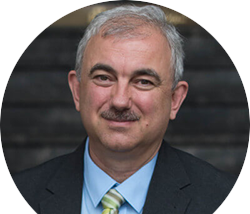
Abstract
Two of the greatest challenges humanity faces today are feeding the growing population of the Earth and protecting the environment. To rise up to these challenges, agriculture must effectively deal with conflicting demands: The increase of the Earth’s population calls for high yields of quality crops, while increasing environmental pressures on Earth’s ecosystems dictate sustainable agricultural production that burdens the environment as little as possible. Examples of how AI can help agriculture include the use of machine learning to build models for yield prediction as well as the use of decision modelling to asses multiple functions of agricultural soil and suggest measures for improving them. Artificial intelligence also plays an increasing role in environmental protection, allowing for more effective environmental modelling and management. For example, remotely sensed data can be used for machine learning to address a variety of tasks, including environmental monitoring and environmental risk assesment. The lecture will briefly introduce key concepts from artficial intelligence and review the use of AI for agriculture and the environment through illustrative case studies.
Biography
Sašo Džeroski is head of the Department of Knowledge Technologies at the Jozef Stefan Institute (Ljubljana, Slovenia) and a full professor at the Jozef Stefan International Postgraduate School. He is also a visiting professor at the European Space Agency (Frascati, Italy). His department develops artificial intelligence methods for machine learning and decision support and uses them to solve practical problems from agriculture and environmental sciences, medicine and life sciences, and space operations/Earth observation.
He has conducted many international projects in basic and applied research, including industrial projects forARVALIS, Institut du vegetal and the European Space Agency. He has participated in numerous EU funded projects and coordinated three of them, most recently the FET Open project MAESTRA (Learning from Massive, Incompletely annotated, and Structured Data). He has also been the chair of numerous international conferences, including ICML, the world-leading conference on machine learning, and ECML PKDD, the premier European international event on data science.
He is currently the chair of the Slovenian Artificial Intelligence Society. He has become a fellow of EurAI, the European Association of Artificial Intelligence, in recognition for his “Pioneering Work in the field of AI and Outstanding Service for the European AI community”. He is a foreign member of the Macedonian Academy of Sciences and Arts and a member of Academia Europea (European Academy of Humanities, Letters and Sciences).
Prof. Themis Exarchos – Ionian University
Title: Artificial Intelligence for Speech Reproduction with Natural Voice in Patients after Tracheostomy
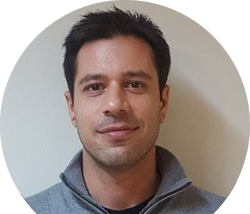
Abstract
Loss of voice, may be due to problems in various organs of the human voice system is a major disability which commonly results in social isolation. By utilizing multimodal information sources such as video, audio and text, a sophisticated personalized voice reconstruction system can be created. In this work we collect videos from a patient talking, before loss-of-voice medical procedures, in order to design a complete system for lip-reading in the Greek language. In order to preprocess the data we apply lip-segmentation and frame-level sampling techniques. Text is matched with the corresponding video frames in order to create a word to frames dataset. Then deep learning methods are applied to create a sequence-to-sequence model for word prediction from lip-area frames. Our results show that the presented model achieves 85% accuracy. Our model is the first deep learning model that is trained to recognize words from lip-are images in the Greek language.
Biography
Themis Exarchos holds an Engineering Diploma, from the Dept. of Computer Engineering and Informatics of University of Patras (2003) and a PhD in Medical Informatics from the Medical School of the University of Ioannina (2009). He has more than 200 publications in journals, conference proceeding and book chapters. He has worked in many research and development projects, funded by EU and other bodies. He is an Assistant Professor of Data Modeling and Decision Support Systems in the Dept. of Informatics, Ionian University, Corfu, Greece and a visiting Professor in the Faculty of Engineering, University of Kragujevac, Serbia.
Prof. Priyanka Harjule – Malaviya National Institute of Technology Jaipur
Title: Optimisation Techniques in AI: Perspectives
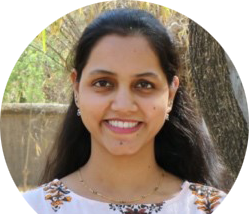
Abstract
The field of applications of Optimisation techniques, is an integral part of machine learning and has attracted much attention of the research community across the globe in the past decade. With an exponential growth in the amount of data and the increase in complexity of a machine learning model, applications of optimisation techniques in machine learning come across more and more challenges. A lot of work on solving optimization problems or improving optimization methods in machine learning has been proposed successively in the literature. The systematic retrospect and perspectives of the applications of optimisation techniques with respect to machine learning are of great significance, which can offer a strong mathematical foundation of any AI model.
Developments of optimisation models are the essence of most AI models. The primary aim of most machine learning algorithms is to build an optimization model and learn the parameters in the objective function from the given data. In the era of immense data, the effectiveness and efficiency of the numerical optimization algorithms dramatically influence the popularization and applications of the machine learning models. In order to promote the development of machine learning, a series of effective optimization methods were put forward, which have improved the performance and efficiency of machine learning methods.
In this talk I will address significant applications of optimisation techniques in most successful machine learning algorithms. Specifically, I will provide perspectives of applications of optimisation techniques in Support Vector machine and Neural networks. Further I will talk about how these perspectives are critical for understanding the mathematical frameworks of machine learning models. This talk will also illustrate some real-world case studies from optimisation in AI models including a quick overview of development of fractional deep neural network model.
Biography
Priyanka Harjule is currently working as Assistant Professor in the Department of mathematics, MNIT Jaipur. Before Joining MNIT, she worked at Indian Institute of Information Technology (IIIT) Kota, as Assistant Professor for two years. During her time at IIIT Kota she has established and set up an e-learning and data analytics lab (elda lab). Currently she is also the coordinator for Centre for e-learning (CeL) at the Information and Communication Centre, MNIT Jaipur. Her research interests include Fractional calculus, Mathematical and statistical Modelling, E-learning, Machine learning and Image Processing.
In the last two years she has worked and published in reputed Journals on development of fractional derivative masks for texture enhancement of medical images and development of fractional order models for viscoelasticity in lung tissues. She has also published papers related to COVID-19 research which includes mathematical modelling for evolution of COVID-19 pandemic in India, applications of machine learning techniques on analysis of impact of online education on the mental health and anxiety levels of school children and their parents in India and finally investigated the causes and impact of misinformation sharing amongst college students during COVID-19 pandemic in India. She was recently granted a patent (Patent No. 2020103810) on Method for Detecting Fake News from the Australian Government. She has also worked on text classification problems with different machine learning classifiers. She is a lifetime member of Society for Special Functions and their applications (SSFA).
Prof. Veljko Milutinović – Adjunct Professor, University of Indiana, Bloomington, IND, USA
Visiting Professor, University of Kragujevac, Serbia
Title: DataFlow SuperComputing for BigData DeepAnalytics
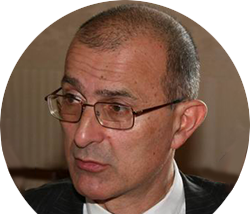
Abstract
This lecture, followed by a mini-tutorial on DataFlow programming, analyses the essence of DataFlow SuperComputing, defines its advantages and sheds light on the related programming model that corresponds to the recent Intel patent about the future Intel’s dataflow processor. The stress is on issues of interest for science and engineering that support machine learning with big data.
Acording to Alibaba and Google, as well as the open literature, the DataFlow paradigm, compared to the ControlFlow paradigm, offers: (a) Speedups of at least 10x to 100x and sometimes much more (depends on the algorithmic characteristics of the most essential loops and the spatial/temporal characteristics of the Big Data Streem, etc.), (b) Potentials for a better precision (depends on the characteristics of the optimizing compiler and the operating system, etc.), (c) Power reduction of at least 10x (depends on the clock speed and the internal architecture, etc.), and (d) Size reduction of well over 10x (depends on the chip implementation and the packiging technology, etc.). The bigger the data, and the higher the reusability of individual data items (which is typical of ML), the higher the benefits of the dataflow paradigm over the control flow paradigm. However, the programming paradigm is different, and has to be mastered.
The follow-up mini tutorial (to be organized after the symposium, via zoom) explains the programming paradigm details, using Maxeler as an example and sheds light on the ongoing research, which, in the case of the speaker, was highly influenced by four different Nobel Laureates: (a) from Richard Feynman it was learned that future computing paradigms will be successful only if the amount of data communications is minimized; (b) from Ilya Prigogine it was learned that the entropy of a computing system could be minimized if spatial and temporal data get decoupled; (c) from Daniel Kahneman it was learned that the system software should offer options related to approximate computing; and (d) from Tim Hunt it was learned that the system software should be able to trade between latency and precision. The follow-up mini tutorial also includes hands-on opportunities for attendees.
Biography
Veljko Milutinović (1951) received his PhD from the University of Belgrade in Serbia, spent about a decade on various faculty positions in the USA (mostly at Purdue University and more recenlty at the Indiana University in Bloomington), and was a co-designer of the DARPAs first GaAs RISC microprocessor at 200MHz (about a decade before commercial efforts on the same speed) and the DARPAs first GaAs Systolic Array with 4096 processors on 200MHz (both well documented in the open literature). Later, for about three decades, he taught and conducted research at the University of Belgrade, in EE, MATH, BA, and PHYS/CHEM. Now he serves as the Chairman of the Board of IPSI Belgrade (a spin-off of Fraunhofer IPSI from Darmstadt, Germany). His research is mostly in datamining algorithms and dataflow computing, with the emphasis on mapping of data analytics algorithms onto fast energy efficient architectures. For 20 of his edited books and related publications, focused forewords or condensed wisdom were contributed by 20 different Nobel Laureates with whom he cooperated on his past industry sponsored projects. He has over 100 SCI journal papers (mostly in IEEE and ACM journals), well over 1500 Thomson-Reuters citations, well over 1500 SCOPUS citations and well over 5000 Google Scholar citations, with h=40 and i10=108 and i100=10.
Short or long courses on the subject he delivered so far in a number of universities worldwide: MIT, Harvard, Boston, NEU, Dartmouth, U of Massachusetts at Amherst, USC, UCLA, Columbia, NYU, Princeton, NJIT, CMU, Temple, Purdue, IU, UIUC, Michigan, Wisconsin, Minnesota, FAU, FIU, Miami, Central Florida, Alabama, Tennessee, GeorgiaTech, OhioState, Imperial, King’s, Manchester, Haddersfield, Cambridge, Oxford, Dublin, Cork, Cardiff, Edinburgh, EPFL, ETH, TUWIEN, UNIWIE, Karlsruhe, Stuttgart, Bonn, Frankfurt, Heidelberg, Aachen, Darmstadt, Dortmund, KTH, Uppsala, Karlskrona, Karlstad, Napoli, Salerno, Siena, Pisa, Barcelona, Madrid, Valencia, Oviedo, Ankara, Bogazici, Koc, Istanbul, Technion, Haifa, BerSheba, Eilat, Arad, Cluj, etc, etc. Also at the World Bank in Washington DC, IMF, the Telenor Bank of Norway, the Reiffeisen Bank of Austria, Brookhaven National Laboratory, Lawrence Livermore National Laboratory, IBM TJ Watson, HP Encore Labs, Intel Oregon, Qualcomm VP, NCR, RCA, Fairchild, Honeywell, Yahoo NY, Google CA, Microsoft, Finsoft, ABB Zurich, Oracle Zurich, and many other industrial labs, as well as at Tsinghua, Shandong, NIS of Singapore, NTU of Singapore, Tokyo, Sendai, Seoul, Pusan, Sydney, Hobart, Auckland, Wellington, Toronto, Montreal, MexicoCity, Durango, etc.
Organizing Committee
Co-chairs:
- Nenad Filipović, University of Kragujevac
- Miloš Kojić, Serbian Academy of Sciences and Arts
- Miloš Đuran, Serbian Academy of Sciences and Arts
- Vesna Ranković, University of Kragujevac
- Vladimir Ranković, University of Kragujevac
- Dragan Đurčić, University of Kragujevac
- Dušan Teodorović, Serbian Academy of Sciences and Arts
- Zoran Lj. Petrović, Serbian Academy of Sciences and Arts
- Steva Todorčević, Serbian Academy of Sciences and Arts
- Vladan Devedžić, Serbian Academy of Sciences and Arts
Local Organization:
- Tijana Šušteršič, University of Kragujevac
- Smiljana Tomašević, University of Kragujevac
- Aleksandra Vulović, University of Kragujevac
- Anđela Blagojević, University of Kragujevac
- Nikola Radovanović, University of Kragujevac
- Đorđe Dimitrijević, University of Kragujevac
- Dalibor Nikolić, University of Kragujevac
- Igor Saveljić, University of Kragujevac
- Milica Kaplarević, University of Kragujevac
- Marija Gačić, University of Kragujevac
- Neda Vidanović Miletić, University of Kragujevac
- Branko Urošević, School of Computing, Union University
- Boban Stojanović, University of Kragujevac
- Miloš Ivanović, University of Kragujevac
- Branko Arsić, University of Kragujevac
Program Committee:
- Martin Aleksandrov (TU Berlin, Germany)
- Sandra Avila (University of Campinas (Unicamp), Brazil)
- Christian Blum (Spanish National Research Council (CSIC), Spain)
- Carlos Cardonha (University of Connecticut, United States)
- Vinay Chaudhri (United States)
- John Chinneck (Carleton University, Canada)
- Andy Chun (City University of Hong Kong, Hong Kong)
- Andre Augusto Cire (University of Toronto, Canada)
- Bradley Clement (Jet Propulsion Laboratory, United States)
- Dubravko Ćulibrk (University of Novi Sad, Serbia)
- Veljko Milutinović (University of Kragujevac and University of Belgrade, Serbia)
- Diane Cook (Washington State University, United States)
- Gabriella Cortellessa (CNR-ISTC, National Research Council of Italy, Italy)
- Lizhen Cui (Shandong University, China)
- Akay Metin (University of Houston, USA)
- Allen Robert (University of Southampton, UK)
- Zoran Bosnić (University of Ljubljana, Slovenia)
- Zlatan Car (Univeristy of Rijeka, Croatia)
- Ciaccio Edward (Columbia University, USA)
- Themis Exarchos (University of Ioannina, Greece)
- Dimitrios Fotiadis (University of Ioannina, Greece)
- Nikola Jorgovanović (University of Novi Sad, Serbia)
- Zoran Marković (IIT, Serbia)
- Michalopoulos George (University of Pittsburgh, USA)
- Nikita Konstantina (National Technical University of Athens, Greece)
- Zoran Obradović (Temple University, USA)
- Ouzounis Christos (King’s College, UK)
- Pattichis Constantinos (University of Cyprus, Cyprus)
- Sheu Phillio (University of California, USA)
- Stojanović Radovan (University of Montenegro, Montenegro)
- Miroslav Trajanović (University of Niš, Serbia)
- Tsiknakis Manolis (Hellenic Mediterranean University, Greece)
- Yang Guang-Zhong (Imperial College London, UK)
- Zervakis Michalis (University of Crete, Greece)
- Andre de Carvalho (University of São Paulo, Brazil)
- Luca Di Gaspero (DPIA – University of Udine, Italy)
- Matthew Gaston (Carnegie Mellon University, United States)
- Carmen Gervet (Université de Montpellier, France)
- Odd Erik Gundersen (Norwegian University of Science and Technology, Norway)
- Koen Hindriks (Vrije Universiteit Amsterdam, Netherlands)
- Neil Jacobstein (Singularity University, United States)
- Binbin Jia (Southeast University, China)
- Elias Khalil (Georgia Institute of Technology, United States)
- Lars Kotthoff (University of Wyoming, United States)
- Hoong Chuin Lau (Singapore Management University, Singapore)
- Jimmy Lee (The Chinese University of Hong Kong, Hong Kong)
- Lee Mccluskey (University of Huddersfield, United Kingdom)
- Felipe Meneguzzi (Pontifical Catholic University of Rio Grande do Sul, Brazil)
- Mitra Nasri (Delft University of Technology, Netherlands)
- Barry O’Sullivan (University College Cork, Ireland)
- Michael Orosz (University of Southern California Information Sciences Institute, United States)
- Simon Parsons (University of Lincoln, United Kingdom)
- Andrew Perrault (Harvard University, United States)
- David Pynadath (University of Southern California, United States)
- Claude-Guy Quimper (Laval University, Canada)
- Howard Shrobe (Massachusetts Institute of Technology, United States)
- Madhav Sigdel (University of Alabama in Huntsville, United States)
- David Stracuzzi (Sandia National Laboratories, United States)
- Dimitris Stripelis (University of Southern California, United States)
- Nirmalya Thakur (University of Cincinnati, United States)
- Kevin Tierney (Bielefeld University, Germany)
- Michael Trick (Carnegie Mellon University, United States)
- Pradeep Varakantham (Singapore Management University, Singapore)
- Deng-Bao Wang (Southeast University, China)
- Shinjae Yoo (Brookhaven National Laboratory, United States)
- Yingqian Zhang (Eindhoven University of Technology, Netherlands)
- Dubravko Ćulibrk (University of Novi Sad, Serbia)
- Jovan Stojanović (Serbian AI Society, Serbia)
- Stefan Badža (Serbian Government, Serbia)

